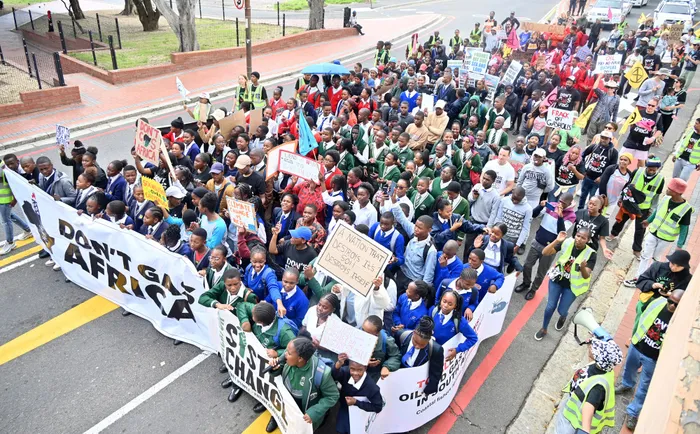COP28 summit must hasten just transition progress

Picture: Ayanda Ndamane African News Agency (ANA) / Taken on March 21, 2023 – In solidarity with the global climate strike, youth, civil society, and affected communities are marching in Cape Town for system change to address the need for energy, water, housing, and food access for all.The groups are marching under the theme ‘Don’t Gas Africa’ and will be handing over a memorandum to Parliament. ‘Our work at the commission shows that while Just transitions are nationally driven agendas, international co-operation can play an important role in sharing experiences and in mobilising additional financial resources towards developing countries,’ says the writer.
By Lebogang Mulaisi
The Presidential Climate Commission (PCC) recently co-hosted a stakeholder engagement with the Minister of Forestry, Fisheries and Environment at which we shared our mandate and expectations for the 28th Conference of Parties to the UN Framework @UNFCCC #COP28.
We are encouraged by the growing momentum to situate “just transition” strongly in UN Framework Convention on Climate Change (UNFCCC) processes which for the first time, at COP26 in November 2021, parties reflected the importance of Just transition to NetZero emissions in the final decision text, as well as the provision of adequate climate finance to support the transitions.
Our work at the commission shows that while Just transitions are nationally driven agendas, international co-operation can play an important role in sharing experiences and in mobilising additional financial resources towards developing countries.
South Africa’s Just Transition framework, which was adopted by the Cabinet last year, is central to all climate action in South Africa and has become a growing imperative internationally.
We are pleased to see Just transition issues emerge strongly in the #GlobalStocktake. The synthesis report on the technical dialogue released by the co-facilitators highlights the Just transition as a key outcome of the discussion.
We need to proactively manage the social and economic consequences of the system-wide transformation required to reach NetZero Skills, with economic diversification and social support strategies to address the negative impacts of response measures and promote positive synergies.
Just transitions can support more robust and equitable mitigation outcomes, with tailored approaches addressing different contexts. Just transition is situated centrally throughout the synthesis report, highlighted in the context of reaching mid-century goals, mobilising finance, and implementing ambitious climate action.
The call was underscored at COP27, with Just transition linked to implementation, the achievement of NetZero emissions, and finance and the emerging Just Energy Transition Partnerships across the world including and inspired by South Africa, and also illustrate the growing momentum towards the amalgamation of climate ambition and climate finance, with the central imperative of equity.
Our work at the commission shows that while Just transitions are nationally driven agendas, international co-operation can play an important role in sharing experiences and in mobilising additional financial resources towards developing countries.
The Global Stocktake marks a significant accountability moment for climate action, shining a spotlight on whether countries are collectively doing enough to reduce emissions, build resilience and increase finance flowing from developed to developing countries. We must use the moment to double down on our efforts and call on other counties to do the same.
Here at home, the PCC is deepening work around monitoring the transition. With the vision and milestones for achieving a just transition increasingly concrete in South Africa, it is essential to develop a process of tracking progress towards those objectives, with a strong focus on evaluation, ensuring that the tracking work improves policy-and decision-making.
Climate change is exacerbating extreme weather events and intensifying floods, storms, and droughts, with many of the worst impacts being felt in Africa.
We reiterate our call and conviction that wealthy nations will need to dramatically scale up finance to support climate-vulnerable countries in withstanding and recovering from climate-driven floods, droughts, heatwaves and more – given the global economic consequences of the impacts, it’s deeply in their interests to act.
With the experiences of the devastating impacts of climate-induced disaster, we once again call upon countries and parties to reach a consensus to operationalise the Loss and Damage Fund at COP28 and broader funding arrangements with finance that is new, additional, predictable, accessible, adequate and rapid.
Developed countries must demonstrate they will make good on their commitment to climate-vulnerable nations to double finance for adaptation by 2025, including channelling more resources and decision-making power to sub-national governments and local communities. Coupled with that, countries must adopt an actionable plan for the Global Goal on Adaptation, including agreeing on an ambitious set of targets for adaptation action.
We appreciate our exchanges with countries across the world and see many of our peers wrestling with similar issues around the pace of decarbonisation, the ways to embody justice in the change and securing finance in the transition.
These types of exchanges can be strengthened in the new UNFCCC work programme on Just transition pathways, which we support. Team #Climateza looks forward to engaging with the global community at COP28UAE on various aspects of the Just Transition and Climate Action.
Lebogang Mulaisi is chief operating officer of the Presidential Climate Commission